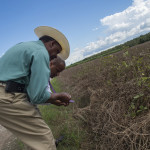Tallahassee, Fla.– Housing inspectors contracted by the Federal Emergency Management Agency are assisting eligible survivors of the recent flooding by visiting neighborhoods and checking for damage.
“The free FEMA housing inspections are an essential step in the recovery process for survivors who sustained damage to their homes,” said Federal Coordinating Officer Terry L. Quarles. “It’s vital that survivors register with FEMA, ensure we have their current contact information and then coordinate with the housing inspector to schedule the inspection.”
Survivors in Citrus, Dixie, Hernando, Hillsborough, Leon, Levy, Pasco and Pinellas counties can register by calling FEMA’s helpline at 800-621-3362, which is video relay service accessible. Survivors who are deaf, hard of hearing or who have difficulty speaking may call TTY 800-462-7585. Helpline hours are 7 a.m. to 10 p.m. local time, seven days a week until further notice. Survivors can also register online at DisasterAssistance.gov.
The recovery process begins when those living in the eight counties designated for individual disaster assistance complete the registration process. Survivors need to register with FEMA and report uninsured or underinsured damage to their homes, vehicles or other personal property. An inspector will then contact the applicant and schedule an appointment to visit the home.
When FEMA inspectors arrive at a home, they will display official photo identification. If the photo identification is not displayed, it is important to ask to see it. This helps prevent fraud.
To speed the inspection process, applicants should:
-
Ensure their home or mailbox number is clearly visible from the road.
-
Keep their appointment or notify the inspector if a postponement is necessary.
-
Authorize another adult to act as their agent and be present on their behalf during the inspection if they have evacuated and cannot return for the inspection.
-
Be reachable, informing neighbors where they can be contacted if they are not staying in the home.
-
Tell the inspector about other property losses or disaster-related needs such as transportation, medical or dental care, tools needed for a trade if not self-employed and educational materials, so inspectors can relay the information to FEMA.
-
Take photos of their homes, if possible, which can be used to supplement photos taken by the inspector.
Inspectors try a minimum of three times to contact each applicant, calling at different times on different days. If inspectors cannot reach an applicant, they will post a letter at the applicant’s dwelling with a phone number the applicant should call to reschedule an appointment and/or have the inspection reissued.
The damage inspection generally lasts 20-45 minutes. The inspector does not need to document all damage. As part of the inspection process, homeowners are asked to show proof of ownership, such as a tax bill, a deed, mortgage payment receipt or insurance policy with the property’s address. Renters must show proof of occupancy, a lease, rent payment receipt, utility bill or another document confirming the location was their primary residence at the time of the disaster. Both homeowners and renters also must have a valid driver’s license or other photo identification.
Inspectors document disaster-related damage, but do not determine the applicant’s eligibility for FEMA assistance. They check for damage to the structure and building systems, to major appliances and septic systems and wells, and enter information into an electronic device that sends the information to FEMA. This speeds up the process of providing assistance.
A U.S. Small Business Administration loss verifier also may schedule an appointment with applicants who have completed an SBA loan application. Like FEMA inspectors, SBA loss verifiers and insurance adjusters are required to carry identification. Residents should ask to see a photo ID if any inspector comes to their home.
Residents should not be concerned if an inspector is seen in their neighborhood, but does not visit every home. They are following schedules and can only visit houses on that day’s list.
FEMA’s mission is to support our citizens and first responders to ensure that as a nation we work together to build, sustain, and improve our capability to prepare for, protect against, respond to, recover from, and mitigate all hazards.
Disaster recovery assistance is available without regard to race, color, religion, nationality, sex, age, disability, English proficiency or economic status. If you or someone you know has been discriminated against, call FEMA toll-free at 800-621-FEMA (3362). For TTY call 800-462-7585.
FEMA’s temporary housing assistance and grants for public transportation expenses, medical and dental expenses, and funeral and burial expenses do not require individuals to apply for an SBA loan. However, applicants who receive SBA loan applications must submit them to SBA loan officers to be eligible for assistance that covers personal property, vehicle repair or replacement, and moving and storage expenses.
###




